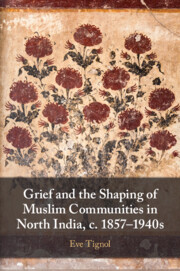Book contents
- Grief and the Shaping of Muslim Communities in north India, c. 1857–1940s
- Grief and the Shaping of Muslim Communities in north India, c. 1857–1940s
- Copyright page
- Contents
- Figures
- Acknowledgements
- Note on Transliteration
- Abbreviations
- Introduction
- 1 A Garden Lost
- 2 Useful Grief
- 3 Memorials, Feelings, and Public Recognition, c. 1911–1915
- 4 Empowering Grief
- 5 Nostalgia in Delhi
- Epilogue
- Glossary
- Bibliography
- Index
5 - Nostalgia in Delhi
Local Memory and Identity, c. 1910–1940
Published online by Cambridge University Press: 03 March 2023
- Grief and the Shaping of Muslim Communities in north India, c. 1857–1940s
- Grief and the Shaping of Muslim Communities in north India, c. 1857–1940s
- Copyright page
- Contents
- Figures
- Acknowledgements
- Note on Transliteration
- Abbreviations
- Introduction
- 1 A Garden Lost
- 2 Useful Grief
- 3 Memorials, Feelings, and Public Recognition, c. 1911–1915
- 4 Empowering Grief
- 5 Nostalgia in Delhi
- Epilogue
- Glossary
- Bibliography
- Index
Summary
This chapter analyses the nostalgia deployed in 1910s–1930s memoirs of Mughal Delhi by local ashrāf prose writers. It argues that the idealisation of the pre-colonial local past enabled authors to face the displacement lived during the construction of the colonial capital and the growing challenges of communal tension in the city. As heterogeneous texts both recording knowledge and inducing multi-sensory pleasure in the manner of qissahs (tales), city memoirs aimed at moving the Mughal past permanently into collective fantasy and at maintaining collective identity continuity. Examining the elements of nostalgic recollection, the chapter shows that those memoirs responded to the urgencies of the present, by articulating a critique of British rule and of the growth of communalism, but that they also reflected a Muslim collective identity that yearned for power.
- Type
- Chapter
- Information
- Publisher: Cambridge University PressPrint publication year: 2023

